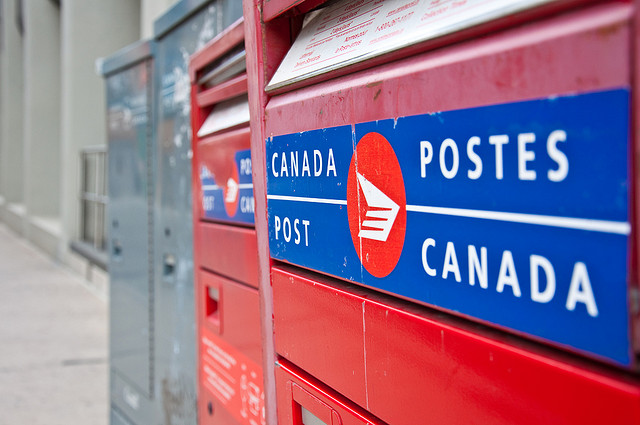Opponents of changes to Canada Post have a lot of company these days.
Over 218,000 people have signed on to a change.org petition started by Susan Dixon, which aims to save home delivery. And recently, Canadian Union of Postal Workers (CUPW) and its new President Mike Palecek, and residents of Hamilton, Ontario, have been successful in postponing the plan to end door-to-door delivery on Hamilton Mountain.
The petition “Don’t let Canada Post end door to door delivery / Sauvons la livraison à domicile” cites mental health issues, disabilities, mobility issues, family circumstances, major surgery, and the weather as reasons to keep home delivery.
Dixon told rabble how widespread she has found opposition to be across Canada and beyond. To date, 575 municipalities have expressed their opposition to the plan. She is certain that at least one party will make this an election issue.
On December 11, 2013 Canada Post announced — without the consultation process that they have followed in years previously — that they will be gradually phasing out door-to-door delivery of mail. These changes are seen by many to be a precursor to privatization, although that has been strongly denied by Canada Post.
“We believe this is part of a broader plan to privatize Canada Post,” said Palecek, who was recently elected president of CUPW. “These cuts are not simply about home mail delivery, but also plan to privatize many retail outlets.”
Canada Post cited a fiscal deficit, and a 1.5 billion decrease of letters sent between 2006 and 2014 as the reasons for the changes. Deepak Chopra, Canada Post Corporation president and ex-CEO of Pitney Bowes, a privately owned company selling postal equipment, claims that one must “place your bets on horses that will win,” and that Canada Post must, in phasing out door-to-door deliveries, act before it is too late.
In 2013 Canada Post delivered approximately 9.4 billion pieces of mail, of which 63 per cent was door-to-door or to-apartment-building service. Letter deliveries are certainly in decline, but they held up in 2014, while package deliveries increased dramatically.
After the recent release of the 2014 figures, which showed a $194 million profit, many continue to question whether or not the reforms are an economic necessity, or mere ideology.
After a pre-tax profit of $24 million in 2015 these questions will not dissipate.
As Canada Post’s profit steadily grows and the price of stamps are rising by 35 per cent, “6,000 to 8,000 positions will be reduced in the coming years,” according to Canada Post spokesperson Jon Hamilton.
The NDP propose to save home delivery and keep Canada Post as a Crown corporation, the Liberals remain tightly lipped — only stating they will suspend further transferals to community boxes — whereas the Tories are obviously in favour — although they claim that Canada Post makes its own decisions.
In Hamilton, the current hotspot of the battle against community mailboxes, both sides have claimed victories in court. The local CUPW has stated that the plan to end door-to-door delivery has been put on “indefinite hold.” Canada Post has insisted it will happen this summer.
This is certainly, however, a national issue and it shows no signs of letting up as we approach the October election. The combination of the Save Canada Post campaign; the national, provincial and local CUPW branches; and the actions of ordinary citizens like Dixon who “will not give up this fight until its over,” will ensure that the Liberals and New Democrats will be called upon to offer a workable alternative to the Conservative plan for Canada Post.
Mattha is a freelance journalist who is currently studying History between Montreal and London. He has a keen interest in politics, current affairs and the absurd. You can find him on Twitter: @itsmattha
Photo: flickr/ Evan Goldenberg




